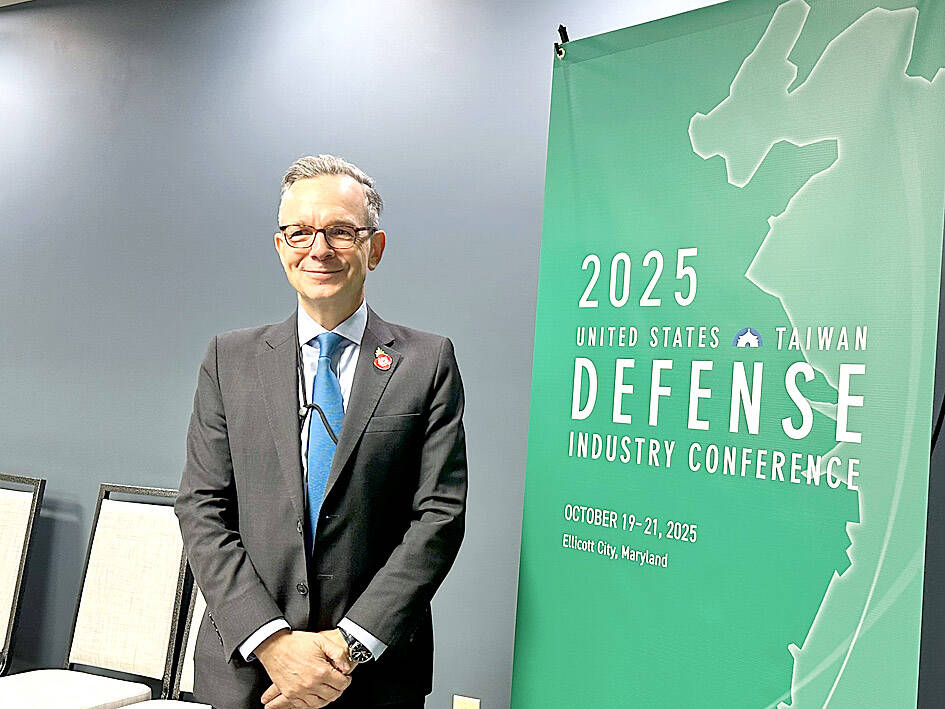The US government is expected to release new guidelines to help expedite transfers of defense technology to its partners, including Taiwan, the head of the US-Taiwan Business Council said on Tuesday.
The revisions to defense and state department guidelines seek to expedite “consideration and then releasability” of defense tech products, Rupert Hammond-Chambers said, without elaborating, at the annual US-Taiwan Defense Industry Conference in Ellicott City, Maryland.
Defense manufacturers delivering their orders on time is an issue stressed by Taiwanese and US representatives at the three-day conference, which began on Sunday, Hammond-Chambers told reporters.

Photo: CNA
However, the codevelopment and coproduction of weapons — which some lawmakers, including US Senator Roger Wicker, have voiced support for — would not provide a quick solution to delayed arms sales, he said.
“If you need things quickly, the logical thing to do is buy something off the shelf. If you have time, then you can ask for a tech transfer” to take that technology and adapt it for your purposes, he said.
Hammond-Chambers also previewed what arms purchases Taiwan could make under its defense budget for next year, as well as a special defense budget of up to NT$1 trillion (US$32.54 billion) that is expected to be announced next month.
Taiwan would likely seek technology related to the “T-Dome” — a multilayered air defense system President William Lai (賴清德) proposed earlier this month — as well as asymmetric warfare capabilities, he said.
Given the volume of spending available, Taiwan “will also have opportunities to address gray zone and blockade” concerns, and acquire more traditional platforms, such as mobile artillery and helicopters, he said.
On the political front, Hammond-Chambers downplayed the possibility of a US policy change if US President Donald Trump meets with Chinese President Xi Jinping (習近平).
Beijing has reportedly been pushing the US to change its official policy to state that it “opposes” Taiwanese independence, rather than merely “not supporting” it.
On such topics, the US and China tend to “talk past each other,” with each side stating its demands, before moving onto issues that they might make some headway on, such as tariffs and a trade deal, Hammond-Chambers said.

Right-wing political scientist Laura Fernandez on Sunday won Costa Rica’s presidential election by a landslide, after promising to crack down on rising violence linked to the cocaine trade. Fernandez’s nearest rival, economist Alvaro Ramos, conceded defeat as results showed the ruling party far exceeding the threshold of 40 percent needed to avoid a runoff. With 94 percent of polling stations counted, the political heir of outgoing Costa Rican President Rodrigo Chaves had captured 48.3 percent of the vote compared with Ramos’ 33.4 percent, the Supreme Electoral Tribunal said. As soon as the first results were announced, members of Fernandez’s Sovereign People’s Party

MORE RESPONSIBILITY: Draftees would be expected to fight alongside professional soldiers, likely requiring the transformation of some training brigades into combat units The armed forces are to start incorporating new conscripts into combined arms brigades this year to enhance combat readiness, the Executive Yuan’s latest policy report said. The new policy would affect Taiwanese men entering the military for their compulsory service, which was extended to one year under reforms by then-president Tsai Ing-wen (蔡英文) in 2022. The conscripts would be trained to operate machine guns, uncrewed aerial vehicles, anti-tank guided missile launchers and Stinger air defense systems, the report said, adding that the basic training would be lengthened to eight weeks. After basic training, conscripts would be sorted into infantry battalions that would take

GROWING AMBITIONS: The scale and tempo of the operations show that the Strait has become the core theater for China to expand its security interests, the report said Chinese military aircraft incursions around Taiwan have surged nearly 15-fold over the past five years, according to a report released yesterday by the Democratic Progressive Party’s (DPP) Department of China Affairs. Sorties in the Taiwan Strait were previously irregular, totaling 380 in 2020, but have since evolved into routine operations, the report showed. “This demonstrates that the Taiwan Strait has become both the starting point and testing ground for Beijing’s expansionist ambitions,” it said. Driven by military expansionism, China is systematically pursuing actions aimed at altering the regional “status quo,” the department said, adding that Taiwan represents the most critical link in China’s

‘REALLY PROUD’: Nvidia would not be possible without Taiwan, Huang said, adding that TSMC would be increasing its capacity by 100 percent Nvidia Corp CEO Jensen Huang (黃仁勳) on Saturday praised and lightly cajoled his major Taiwanese suppliers to produce more to help power strong demand for artificial intelligence (AI), capping a visit to the country of his birth, where he has been mobbed by adoring fans at every step. Speaking at an impromptu press conference in the rain outside a Taipei restaurant, where he had hosted suppliers for a “trillion-dollar dinner,” named after the market capitalization of those firms attending, Huang said this would be another good year for business. “TSMC needs to work very hard this year because I need a lot